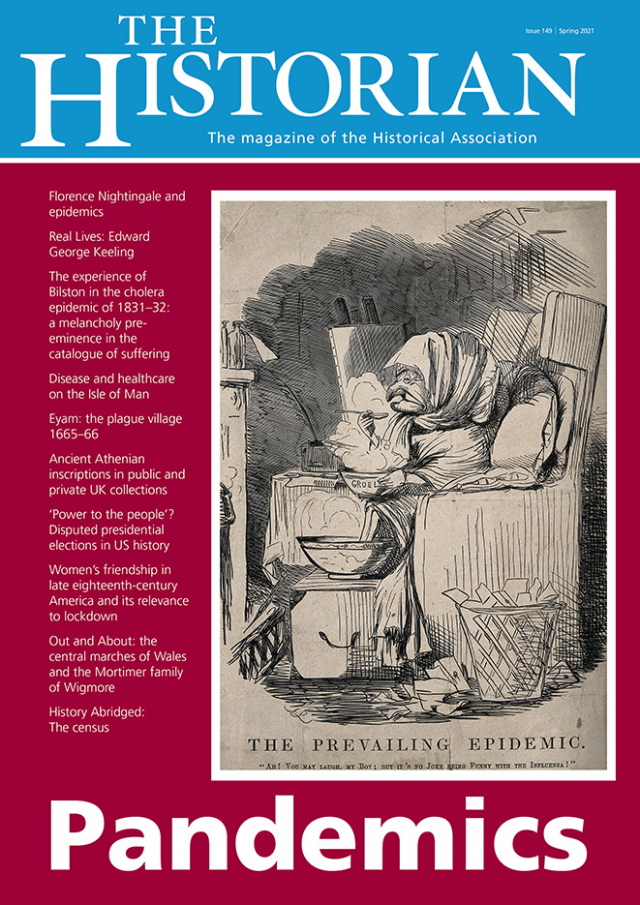The Historian 149: Out now
The magazine of the Historical Association

Editorial: Pandemics
Read The Historian 149: Pandemics
This edition of The Historian follows immediately after the annual Local and Community History Month, which we launched many years ago. Although our expressed purpose on this occasion is to place a special focus on the concept of pandemics and epidemics, a number of our articles equally also reflect our commitment to the study of local sources as a basis of wider research.
One unfortunate casualty of our pandemic has been the fact that the bicentenary of the birth of Florence Nightingale did not have the public attention that it warranted. Much that had been planed has been overtaken or overshadowed by other priorities. One of the major features of the planned celebration was the publication by a team from Nottingham University of a work entitled Florence Nightingale at Home,1 to which one of our authors was a contributor.
Its curious title draws us into an exploration of Florence Nightingale’s personal philosophy and, indeed, piety. We learn that as a teenager she nursed virtually all the members of the family household, relatives and staff, through a major influenza outbreak. Her sense of a religious call to service became strong at that point and, although her father refused to allow her to begin nursing, she rather determinedly began to develop her links with the Kaiserwerth Deaconesses Institute in Germany. By 1853 she was beginning to be involved in nursing care and, of course, in 1854 she departed to Scutari where she took charge of nursing at two military hospitals. From her return to England in 1856, despite persistent ill-health, she became what we would now describe as a very significant ‘influencer’ in the development of medical and nursing policies. By her death in 1910, she was undoubtedly the most famous woman in England.
What this book succeeds in doing is to convey the philosophy behind Florence Nightingale’s proposals and ideas. Based on her own experience, she had this real sense of ‘home’, not in a physical sense but in the sense of what we would now label a ‘mind set’. Her view was that the purpose of all nursing strategies was to make sure that anyone who was invalided would feel that their treatment was ‘as if they were at home’. This was a very practical philosophy built on her experience as a young woman providing philanthropic support to neighbours, on her faith and also on the challenges she experienced in the Crimean War. This book provides a strong explanation of how Florence Nightingale emerged as such a force for good; and it is unfortunate that we have been unable to celebrate her over the past year as directly as we might have done. This book does help us very significantly to understand Florence Nightingale in her new perspective.
Despite our commitment to our central focus on the Pandemic, we have been also fortunate in being able to provide a major commentary on the nature of the American Presidential ‘selection’ process; a key item on the interpretation of Attic inscriptions; a contribution by a young writer on women’s friendship in the Eighteenth Century; and an introduction to evidence of the Marcher landscape between Wales and England; along with our regular features, for which I am also very grateful.

